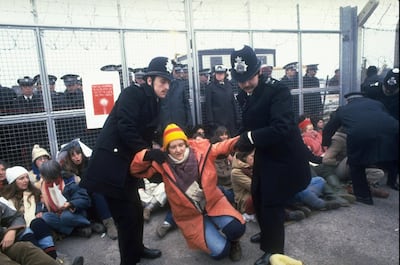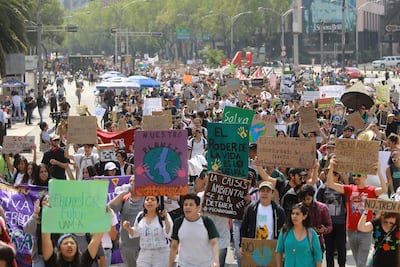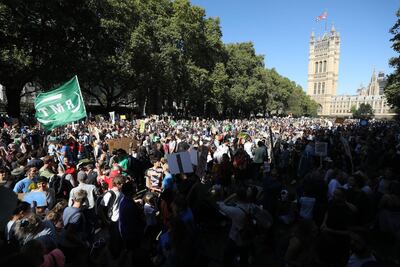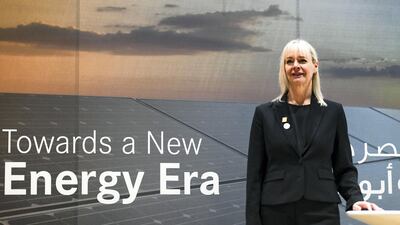The next leader of one of the most influential bodies in global energy has praised millions of young activists who are demanding faster action on climate change but warned that a transition to renewables will not be achieved in "one leap".
In November, Angela Wilkinson will become the first female chief executive and secretary general of the World Energy Council in its 95-year history, at a time of growing calls for a rapid move away from fossil fuels.
In an interview with The National, Dr Wilkinson said she welcomed the challenge from a younger generation, embodied by Swedish 16-year-old Greta Thunberg, not least because she used to be a youth activist herself.
Dr Wilkinson revealed that when she was the same age as Ms Thunberg she took part in protests against nuclear weapons at Greenham Common, a women's peace camp in Berkshire, England, next to what was then a storage site for British cruise missiles.
Last week, Ms Thunberg was one of millions of young people across the world to go on “strike” over global warming inaction, ahead of this week’s UN climate summit.
“I grew up in a time of the threat of nuclear war,” Dr Wilkinson said. “So at the age of 16 I left home because I wanted to know how to become an anti-nuclear, disarmament protester and marched to Greenham Common.

“I would be more worried if there were no protests [today]; no challenge coming from teenagers and the youth for older generations.
“Which child has never thought their parents out of touch, which child has never thought their parents should just get out of the way?”
While she said she welcomed the engagement of young people, Dr Wilkinson also issued a call for realism in the debate over decarbonisation.
Extinction Rebellion, a radical UK-based campaign group which advocates worldwide acts of civil disobedience to force faster action on climate change, has called on the British government to reduce carbon emissions to net zero by 2025. The WWF backs a 2040 target in Europe.
Ms Thunberg - who refuses to fly and recently sailed to New York for a United Nations climate summit on a solar-powered yacht - and other prominent activists regularly attack politicians, businesses and industry leaders for failing to take more progressive action to protect the environment.
A ‘net zero’ scenario would mean emissions from homes, transport, farming and industry would have to be completely avoided, or offset by planting trees that would compensate by removing CO2 from the atmosphere.

However, the Committee on Climate Change, an independent group established to advise the UK government, said in a recent report that 2050 was the earliest “credible” date by which the goal, since adopted by British ministers, could be achieved.
António Guterres, the United Nations General Secretary, and the European Commission has also backed the net zero emissions by 2050 target, although some experts have warned that even that is unrealistic. Critics argue it risks increasing food insecurity and economic inequality, and would be reliant on technology that does not yet exist.
“We can go faster with decarbonisation but if we go too fast, we risk new energy shocks but also excluding a lot of the population,” said Dr Wilkinson, speaking at the World Energy Congress in Abu Dhabi earlier this month.
“Youth can make things look very simple, when they’re very complex.

“I believe in the future we will have ubiquitous, renewable energy for everybody. The question is when will we have it and how do we get from here to there.
"People who tell me we [get there] with one leap, from coal to wind, or coal to solar, I think the challenge is must more nuanced that that. The middle ground – the bridge – is very important.
“We’re going to have to use clean coal in some countries because like it or not, that’s what they’ve got, and they’re not going to go without giving their population energy.”
Another issue that has risen to global prominence over recent years has been that of gender equality, with widespread calls to address what many see as endemic sexism faced by women both in the workplace and wider society.
But as the first female incoming head of the World Energy Council, Dr Wilkinson said she had never personally had to face gender-based discrimination during her three-decade-long career.
With a PhD in physics and a CV that includes roles advising business leaders, ministers and positions at the University of Oxford and the Organisation for Economic Co-operation and Development, the 58-year-old said she had been “mentored and enabled by an exceptional group of senior male leaders” who had encouraged women to take on senior roles in the energy sector.
She is currently a senior director for scenarios and business insights at the same body she will oversee as chief executive in November.

“I don’t work in the energy sector thinking of myself as a female, I work in the energy sector thinking of myself as an energy professional,” she said. “I don’t sit there thinking I’m playing the gender card or should play the gender card.
"I can talk the talk, I have deep energy experience, I can have a good conversation with a minister or a CEO or an academic and have good credentials. But you’ve got to talk the language of energy, not the language of gender.
“I have been fortunate enough never to have been discriminated against and I don’t know if that’s because I have quite a strong personality, or if it’s just a matter of luck.
“When you build a really good CV, people respect you. If you do things that have impact, people respect you. You can’t get through on a gender card, you’ve got to get through on a performance card.
"And you can’t get through anywhere without being able to relate to different cultures, and speak the vocabulary of different communities.”
But while she believes the energy sector does not have a big issue with gender discrimination, Dr Wilkinson said she worried it is much more pronounced in fields such as politics and media.
In wider society, she said she feared parts of the world were seeing “the return of the trophy wife”, where magazine covers featured a poor choice of role model who did not encourage young women to become professionals.
“I do worry that we’ve sort of gone through peak openness and now we’re on a downward turn a bit,” she said. “So we have to fight a little bit more to make sure that the doors and pathways remain open for the next generation of women.”
Reflecting on the early days of her career, Dr Wilkinson admitted she was a “pioneer in girl power” in the sector, and that while progress has been made, the energy world remained “male dominated”.
This is something she believes is changing, she said, as careers in energy become more appealing to women.
“There’s an opportunity to take on a challenge that’s not just about solving engineering problems,” she said.
“It’s about solving a social problem, addressing an education challenge, solving a challenge facing global humanity.
"I think that makes it much more attractive to women. If you look around now, you find far more women in the world of energy than when I started.”

